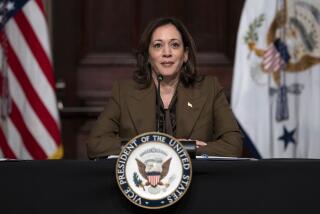Shultz, Soviet Premier Differ on Summit Date
- Share via
STOCKHOLM — Secretary of State George P. Shultz and Soviet Premier Nikolai I. Ryzhkov, in a meeting that ran almost double its scheduled hour, agreed Saturday that U.S.-Soviet relations have not progressed satisfactorily since last November’s Geneva summit.
With Ryzhkov at his side in a room at the Soviet Embassy after their meeting, Shultz said that he and the premier had discussed possible dates for the next summit meeting between President Reagan and Kremlin leader Mikhail S. Gorbachev but were unable to agree on one. Shultz said the summit discussions would continue, presumably through diplomatic channels.
Shultz said he and Ryzhkov agreed that last year’s summit in Geneva formed “a good basis” for Washington-Moscow relations.
Neither Satisfied
“We also agreed that neither of us is satisfied with developments since that time,” Shultz said.
“I agree with you,” Ryzhkov said when Shultz completed his assessment of the talks.
A senior American official said later that Washington is dissatisfied with the pace of the nuclear arms control talks in Geneva and with the failure of Washington-Moscow diplomacy to help solve regional conflicts around the globe.
The two officials, who met after both attended Saturday’s funeral services for Swedish Prime Minister Olof Palme, said they spent most of their time discussing the issues of nuclear testing and the intermediate-range nuclear missile talks now in recess in Geneva.
U.S. and Soviet officials had said earlier that the two sides are much closer to an agreement in their negotiations on the intermediate-range missiles than they are in the other two sets of Geneva talks, those dealing with strategic nuclear missiles and with defensive and space weapons. And the senior American official said after the meeting here that the intermediate-range missile talks are one of the areas “where we feel there has been some movement.”
Rival Proposals
Reagan and Gorbachev have lately exchanged rival proposals for limiting nuclear tests, and Shultz said that he gave Ryzhkov an original copy of Reagan’s most recent proposal, which was publicly unveiled Friday. A key element of the President’s proposal is an invitation to allow Soviet observers to examine U.S. technology for measuring the strength of underground nuclear explosions.
Asked about this latest Reagan plan, Ryzhkov said that the Soviet Union has not yet studied it but that the Kremlin continues to back Gorbachev’s offer, repeated most recently on Thursday, for a moratorium on all nuclear testing.
“What is needed now is for the United States to consider that proposal,” Ryzhkov said.
Talking to reporters aboard the U.S. Air Force jetliner that brought him here from Washington, Shultz said that he was eager to hear from Ryzhkov any Moscow reaction to Reagan’s latest proposal.
He said that he was prepared to elaborate on the President’s public announcement if Ryzhkov wished to ask questions.
Dismissed as ‘Propaganda’
But even before the two men met here, the official Soviet news agency Tass dismissed the President’s latest plan as “a political maneuver. . . , a propaganda gimmick.”
Saturday’s meeting was the first high-level U.S.-Soviet contact since Reagan and Gorbachev met in November. It also was Ryzhkov’s first meeting with any top-ranking U.S. official.
Shultz told reporters on the return flight to Washington that he found Ryzhkov to be “an interesting and able person.”
The senior American official who briefed reporters after the meeting said the hour-and-45-minute session “was not a negotiation--it was part a stock-taking and part a (chance to) get acquainted.”
‘Very Frank’ Talks
Shultz described the meeting as “very frank,” often a diplomatic code word for sharp disagreements. But the secretary of state also said, “I think we both could also agree that the meeting was too short, since there was a lot left to discuss.”
Shultz said his meeting with Ryzhkov was “not a substitute” for a meeting with Soviet Foreign Minister Eduard A. Shevardnadze. Although Reagan and Gorbachev agreed at their Geneva summit that the foreign ministers of the two nations would meet regularly, Moscow has been reluctant to set a date for the next Shultz-Shevardnadze session.
Shultz and Ryzhkov went directly to their meeting at the Soviet Embassy after the elaborate state funeral for Palme.
In an arrival statement, Shultz referred to Palme as “a man of compassion, intellect and integrity.”
Meets 3 Other Leaders
“Americans had our differences with him over policy but never over goals or vision,” Shultz said.
Although many world leaders were in Stockholm, Shultz agreed to meet privately with just three of them. In addition to Ryzhkov, they were Sweden’s newly elected Prime Minister Ingvar Carlsson and President Kenneth D. Kaunda of Zambia.
Shultz said that his objective in scheduling the meeting with Kaunda, a harsh critic of U.S. support for Angolan rebel leader Jonas Savimbi, was to “show our great interest in southern Africa and our desire to move things forward.”
He said that Washington would like to see Kaunda, one of Africa’s most respected senior statesmen, use his influence to persuade Angola to respond to South Africa’s week-old proposal to begin implementation of Namibian independence on Aug. 1, provided Angola agrees to the departure of an estimated 30,000 Cuban troops now in Angola.
Repeats Opposition
In a series of recent interviews, however, Kaunda has said that Angola cannot dispense with the Cuban troops as long as it is faced with armed attacks by Savimbi’s guerrillas, who are supported by South Africa.
Shultz told reporters aboard his jetliner on the flight back to Washington that Kaunda repeated his opposition to U.S. support for Savimbi. However, Shultz said he and the Zambian president “agree that our objectives are to find a way to bring apartheid to an end . . . and find a way to see that Namibia becomes independent.”
More to Read
Sign up for Essential California
The most important California stories and recommendations in your inbox every morning.
You may occasionally receive promotional content from the Los Angeles Times.













